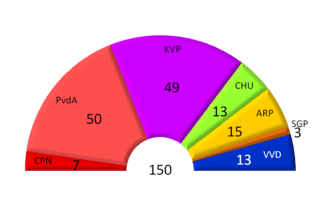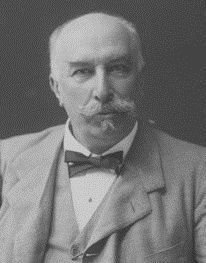| |||||||||||||||||||||||||||||||||||||||||||||||||||||||||||||||||||||||||||||||||
| Turnout | 88.6% | ||||||||||||||||||||||||||||||||||||||||||||||||||||||||||||||||||||||||||||||||
|---|---|---|---|---|---|---|---|---|---|---|---|---|---|---|---|---|---|---|---|---|---|---|---|---|---|---|---|---|---|---|---|---|---|---|---|---|---|---|---|---|---|---|---|---|---|---|---|---|---|---|---|---|---|---|---|---|---|---|---|---|---|---|---|---|---|---|---|---|---|---|---|---|---|---|---|---|---|---|---|---|---|
This lists parties that won seats. See the complete results below. | |||||||||||||||||||||||||||||||||||||||||||||||||||||||||||||||||||||||||||||||||
| |||||||||||||||||||||||||||||||||||||||||||||||||||||||||||||||||||||||||||||||||
 |
|---|
| This article is part of a series on the politics and government of the Netherlands |
Local government |
|
General elections were held in the Netherlands on 3 July 1918. [1] They were the first elections held after a series of reforms that introduced universal male suffrage and pure proportional representation, replacing the previous system using first-past-the-post voting in single member constituencies. [2] This change was known as the Great Pacification, which also included the introduction of state financing of religious schools, and led to the start of consociational democracy. [3]

The Netherlands is a country located mainly in Northwestern Europe. The European portion of the Netherlands consists of twelve separate provinces that border Germany to the east, Belgium to the south, and the North Sea to the northwest, with maritime borders in the North Sea with Belgium, Germany and the United Kingdom. Together with three island territories in the Caribbean Sea—Bonaire, Sint Eustatius and Saba— it forms a constituent country of the Kingdom of the Netherlands. The official language is Dutch, but a secondary official language in the province of Friesland is West Frisian.
Open list describes any variant of party-list proportional representation where voters have at least some influence on the order in which a party's candidates are elected. This as opposed to closed list, which allows only active members, party officials, or consultants to determine the order of its candidates and gives the general voter no influence at all on the position of the candidates placed on the party list. Additionally, an open list system allows voters to select individuals rather than parties. Different systems give voter different amounts of influence. Voter's choice is usually called preference vote.

A first-past-the-post electoral system is one in which voters indicate on a ballot the candidate of their choice, and the candidate who receives the most votes wins. This is sometimes described as winner takes all. First-past-the-post voting is a plurality voting method. FPTP is a common, but not universal, feature of electoral systems with single-member electoral divisions, and is practiced in close to one third of countries. Notable examples include Canada, India, the United Kingdom, and the United States, as well as most of their current or former colonies and protectorates.
The change in the electoral system led to major changes in the political make-up of the House of Representatives. The confessional right-wing parties, the General League of Roman Catholic Caucuses, the Anti-Revolutionary Party and the Christian Historical Union, together won 50 seats. Along with two Christian splinter-parties (the Christian Democratic Party and the Christian Social Party) they were able to gain a majority of 52 seats.

The General League of Roman Catholic Caucuses, informally called the General League, was a Catholic political party in the Netherlands. It is one of the ancestors of the Christian Democratic Appeal, currently a major party in the Netherlands.

The Anti-Revolutionary Party was a Protestant Christian democratic political party in the Netherlands. The party was founded in 1879 by Abraham Kuyper, a neo-Calvinist theologian and minister. In 1980 the party merged with the Catholic People's Party (KVP) and the Christian Historical Union (CHU) to form the Christian Democratic Appeal (CDA).

The Christian Historical Union was a Protestant Christian democratic political party in the Netherlands. The CHU is one of the predecessors of the Christian Democratic Appeal (CDA), into which it merged in September 1980.
The liberal parties lost the most seats. While in 1917, two of the liberal parties, the Liberal Union and the League of Free Liberals, had won 31 seats, they were now reduced to 10 seats. Together with three smaller liberal parties, liberals now held only 15 seats in the House of representatives.

The Liberal Union was a conservative liberal political party in the Netherlands. A major party in its time, the Liberals were one of the historic predecessors of the Liberal State Party, and therefore of the People's Party for Freedom and Democracy.

The League of Free Liberals was a Dutch classical liberal political party and a predecessor of the Liberal State Party which is historically linked to the People's Party for Freedom and Democracy, the major Dutch liberal party. The party's name League of Free Liberals was supposed to convey that the party was not a classical political party, with party discipline and a centralised organisation but a league of independent MPs. The conservative liberals were called free liberals before they had founded a separate party.
The fragmentation of the House was caused by the low electoral threshold of just 0.5%, with the smallest party, the Alliance for the Democratisation of the Army, managing to win a seat with only 6,830 votes.

The Alliance for the Democratisation of the Army was a Dutch political party representing military interests. The VDW played only a marginal role in Dutch politics.
















